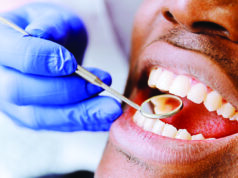By Beatrice Nakibuuka
The Human Papilloma Virus (HPV), is a common virus spread through intimate sexual contact. It is very contagious, and can also spread by close skin-to-skin contact.
There are more than 100 different types of HPV and infections that do not usually cause any symptoms. Although, some types can cause warts on hands, feet, and genitals or inside the mouth.
Most people’s bodies get rid of the virus without treatment, but high-risk types can cause abnormal tissue growth and have for years been associated with several cancers, including cancer of the cervix.
Cervical cancer is the fourth most common cancer in women globally, killing more than 300,000 each year, according to medical reports.

HPV vaccine
On the brighter side, research has found that the HPV vaccine can reduce cases of cervical cancer by nearly 90 per cent.
The vaccine is said to protect one against HPV infection for at least 10 years, although experts think the protection could last longer.
An HPV vaccine could help reduce the number of women who suffer from cancer, but it can only make an impact in the lives of girls who are not yet exposed sexually.
The vaccine has been in existence for some time in several countries around the world before it was introduced in Africa in 2008, starting with South Africa before its eventual adoption by other African countries.
More than 100 countries have now introduced HPV vaccination. However, as of 2020, less than 25 per cent of low-income, and under 30 per cent of lower middle-income countries, had introduced the vaccine, compared with 85 percent of high-income countries.

Uganda’s case
Uganda rolled out the HPV vaccine in 2015, with the World Health Organisation (WHO) recommending that the vaccine be given to girls aged 9-13 years as this is the most cost-effective public health measure against cervical cancer.
The vaccine which works against two serotypes of HPV: 16 and 18, has been available for routine immunisation under the Uganda National Expanded Programme on Immunisation (UNEPI), in a two-dose schedule with an interval of six months between doses.
Cervical cancer ranks as the most frequent cancer among women in Uganda, and the most frequent cancer among women between 15 and 44 years, according to Dr Noleb Mugisha, an oncologist at the Uganda Cancer Institute.
For women who are already sexually active, there are high chances that they have already been exposed to the HPV and the vaccination might not be of much help.
Dr Ndozire Junior, a gynaecologist at MildMay Hospital, Kampala, recommends routine screening so that cancer can be caught early enough because an early diagnosis makes cancer curable.
According to Dr Ndozire, many women are afraid of going for the screening because they think the procedure is complicated and painful.

However, he notes that: “The procedure is simple and is not supposed to be painful.”
Every woman above 21 years who is sexually active should get screened for cervical cancer after every three years.
Those with HIV, diabetes and other health conditions that cause immune suppression should get screened every year.
This can help detect the smallest changes in the cervix and offer treatment before it is too late. Although the vaccine appears to dramatically reduce the chances of developing cervical cancer, it does not protect against all types of HPV.
So, it is important women also have regular cervical checkups once they reach the age of 25. It takes 15 to 20 years for cervical cancer to develop in women with normal immune systems.
However, it can take only 5 to 10 years in women with weakened immune systems such as those with untreated HIV infection.
Dr Ndozire further says: “When the body is exposed to HPV, the immune system of the body tries to fight and clear it.
You, therefore, develop cancer when the body is unable to fight the virus so the cells in the cervix undergo changes, hence the cancer of the cervix.”

Who is at risk?
The people at high risk of getting cervical cancer are women with multiple sexual partners, those who smoke, those that give birth to many children.
Because many changes happen to the cervix when one gets pregnant, the more the pregnancies, the higher the chances of catching HPV.
Girls who start engaging in sexual activity at an early age, women whose immunity are suppressed, especially those with HIV, diabetes, other cancers and diseases that weaken the immune system, are at higher risk of developing cervical cancer.
Single shot for girls in UK
In the UK, girls are offered the vaccine between the ages of 11 and 13. The vaccine has also been offered to boys since 2019. However, in Uganda, girls are still the first priority.
“The girls are still the target and priority until after a time when they have adequately been covered,” says Dr Micaheal Baganizi, deputy programmes manager at UNEPI.
Teenagers in England will be offered a single shot of HPV vaccine instead of two from September 2023.
Reports from the UK Health Security Agency, state that a single dose is able to provide protection as robust as the two doses, and it will be available until age 25.
The reports say that the HPV vaccine programme is one of the most successful ones and has dramatically lowered the cervical cancer rates, thereby, saving lives.
Dr Baganizi also notes that they are aware that the WHO now recommends a single dose, but this can only be implemented if it is outlined as a guideline for all the countries.
He also emphasizes the need for annual cancer screening for sexually active women.
Who gets the vaccine?
The HPV vaccine works best if girls and boys get it before they come into contact with HPV.
The viruses are so widespread that immunisation has to be aimed at children before they become sexually active.
Since the vaccine can only prevent infection, it cannot rid the body of the virus once it has been caught.

The challenges
Cervical cancer is the second most common cancer among women in Africa, but it is the deadliest, according to WHO.
There are several challenges in the diagnosis and treatment of cervical cancer, especially in developing countries.
Inadequate screening programmes, limited access to treatment services and vaccine hesitancy all contribute to this.
Rwanda was one of the first countries in Africa to introduce a vaccination campaign. It launched a plan in 2011 to get girls vaccinated early and to introduce cervical screening for women.
In the first year, it reached nine out 10 girls eligible for the vaccine; a result that experts cite as a model for other countries.
However, HPV vaccine rates remain low even in some developed countries, partly due to misinformation that it could cause infertility in the recipients.

Life-saving
Cancer Research UK, described the finding that showed the vaccine was saving lives.
The study published in the medical journal, The Lancet, looked at what happened after the vaccine was introduced for girls in England in 2008.
It revealed a reduction in both pre-cancerous growths and an 87 per cent reduction in cervical cancer.
It also indicated that the reductions were less dramatic when older teenagers were immunized as part of a catch-up campaign.
This is because fewer older teenagers decided to have the jab and they might have already been sexually active.
Overall, the study estimated the HPV programme has prevented about 450 cancers and 17,200 pre-cancers.
However, it may be hard to assess the impact of the vaccine in Uganda so far since it takes about 15 to 20 years for cervical cancer to develop in women with normal immune system, and it is barely 10 years since the vaccine was rolled out in the country.
Such a measure, Dr Baganizi says can only be done in those countries where the vaccination started many years ago.
“Here in Africa, it may take about 20 years to be able to determine the impact of the reduced cervical cancer cases,” Dr Baganizi says.





















